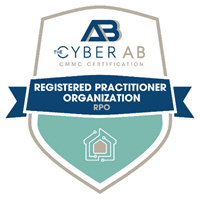Debunking 7 Common CMMC Misconceptions
Many small defense contractors find themselves swamped by conflicting advice on Cybersecurity Maturity Model Certification (CMMC 2.0). Rumors about canceled programs, self-assessment loopholes, and subcontractor exemptions can make you feel insecure or unsure. This article cuts through the noise by exposing the seven biggest myths head-on and revealing the plain-English realities you need to know.
What is CMMC?
The introduction of the Cybersecurity Maturity Model Certification (CMMC) program marks a major achievement. For businesses handling DoD contracts, it helps our country protect its people, military, and industry. Even if you handle Federal Contract Information, it’s essential to protect the contents of that contract. The dangers to our nation’s information security are escalating daily, as adversaries continue to acquire more capabilities.
For companies collaborating with the Department of Defense (DoD), these threats intensify. To get government contracts, businesses must use different information security measures. They need to meet cybersecurity standards and create policies that promote proactive actions within their organizations.
The government initiated the CMMC program following a major security breach that affected contractors and subcontractors. This breach also impacted related government agencies.
This initiative aims to enhance data protection. This data is shared between the Department of Defense and its contractors. It helps the Department feel more confident that they are protecting Controlled Unclassified Information (CUI) appropriately.
CMMC Myth 1: “CMMC Was Canceled—It’s Voluntary Now”
What You’ve Heard: After all the back-and-forth, they say CMMC has been shelved or made optional. You might think you can simply wait and hope the program goes away.
Reality
CMMC 2.0 is here to stay. The final rule, published in October 2024, makes CMMC clauses mandatory in new DoD solicitations starting in Fall 2025. There is no official “pause” or opt-out. Any contract issued after that point will require proof of compliance at the specified level.
CMMC Myth 2: “If We Do NIST SP 800-171, We’ve Reached CMMC Compliance”
What You’ve Heard: Since CMMC is based on NIST 800-171, you think that having the basic controls is enough. You believe no extra work is needed.
Reality
CMMC builds on NIST 800-171’s technical controls. It adds formal assessment processes, evidence requirements, and enforcement mechanisms that the baseline standard lacks. Simply meeting the control objectives is only the first step—CMMC requires that you demonstrate those controls through an approved audit and maintain that proof over time.
CMMC Myth 3: “Everyone Can Self-Assess—No Third-Party Auditor Needed”
What You’ve Heard: You’ve read that self-attestation is an option under CMMC 2.0, and you assume you can skip the cost and hassle of hiring a certified assessor.
Reality
Self-assessment is only available at CMMC Level 1 (for contractors handling Federal Contract Information only). If your firm processes any CMMC Level 2 (CMMC CUI), you must undergo a third-party assessment by a CMMC-Accredited C3PAO. Attempting to self-assess at Level 2 or Level 3 will leave you out of compliance and ineligible for future contracts.
CMMC Myth 4: “Only Large Primes Face Legal Penalties”
What You’ve Heard: You believe that only prime contractors can be sued under the False Claims Act for misrepresenting compliance—and that small subcontractors can quietly opt out.
Reality
The False Claims Act can be—and is—enforced against any contractor handling CUI, prime or subcontractor alike. Misstating your compliance status in the Supplier Performance Risk System (SPRS) exposes your leadership to civil penalties, fines, and reputational damage. There is no “small-business exemption” when it comes to federal contract fraud.
CMMC Myth 5: “Once We’re Certified, We’re Safe Forever”
What You’ve Heard: After you finish your audit, you figure certification is a one-time checkbox—after that, your compliance worries are over.
Reality
CMMC certification is a snapshot in time. To remain compliant, you must continuously monitor your environment, update policies, train new employees, and recertify at least every three years. Treating compliance as a one-and-done project invites drift, gaps, and potential contract disqualification down the road.
CMMC Myth 6: “It’s Only for Big Companies—Small Shops Can Skip It”
What You’ve Heard: You may have heard that CMMC is geared toward defense primes and large subcontractors, so your small shop assumes it doesn’t apply to you.
Reality
If you handle any CUI—even a single file or email—you fall under the same rules as the biggest defense firms. CMMC makes no size-based exemptions. Every small business in the Defense Industrial Base that touches CUI must meet the applicable requirements or risk losing contracts.



CMMC Myth 7: “CMMC Compliance = Security—We’ll Never Get Hacked”
What You’ve Heard: You assume that passing a CMMC audit means your systems are impervious to attack, so you can relax on other security measures.
Reality
CMMC focuses on process and documentation as much as it does on technical controls. While an audit proves you’ve met a defined baseline, it does not guarantee immunity from cyber threats. True security requires ongoing threat hunting, vulnerability management, and incident response capabilities that extend well beyond the certification checklist.
Wrap-Up
By understanding the real requirements—rather than the myths—you can plan your compliance journey with confidence and avoid wasted time or unexpected penalties. Remember: CMMC is mandatory, it goes beyond basic controls, and maintaining your status is an ongoing effort.
Next Step: To simplify every phase of CMMC compliance—from readiness assessment through continuous monitoring—explore how CORE Vault can help.




